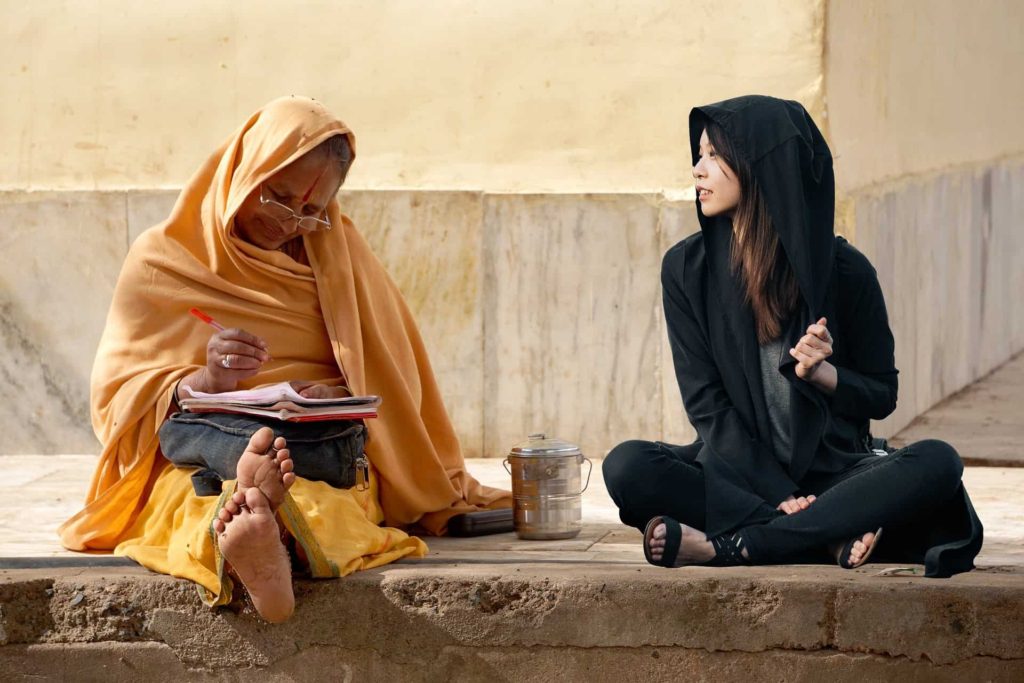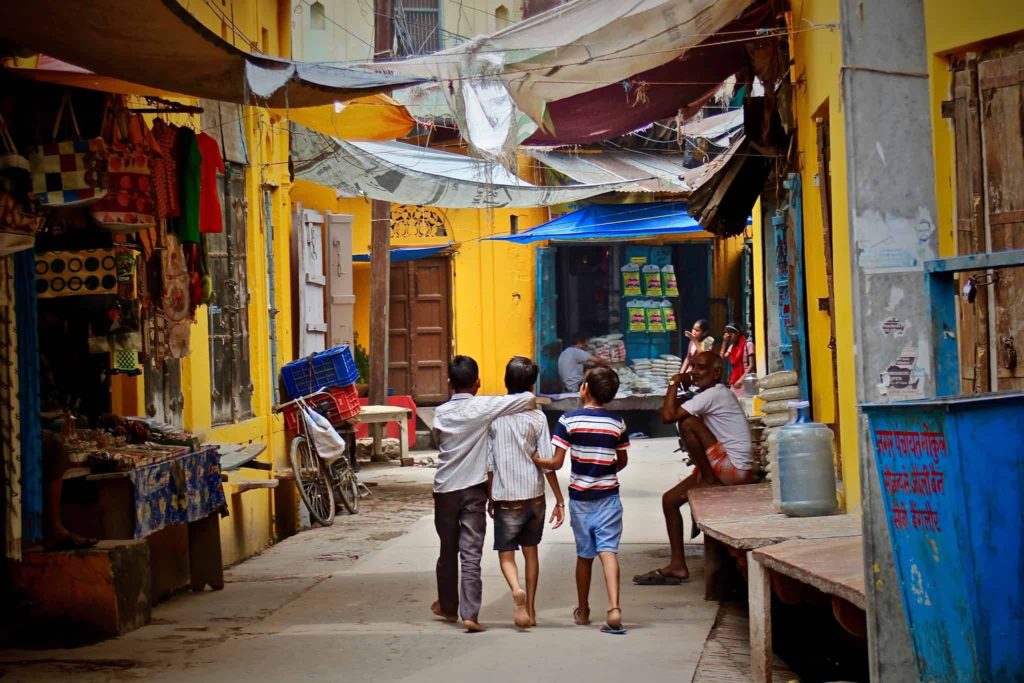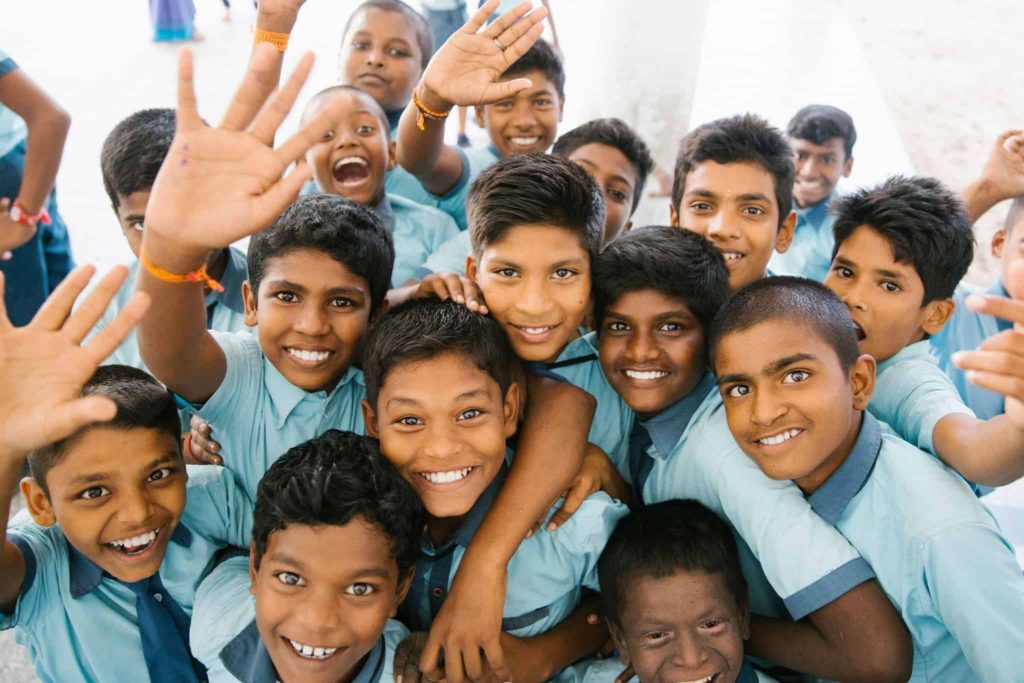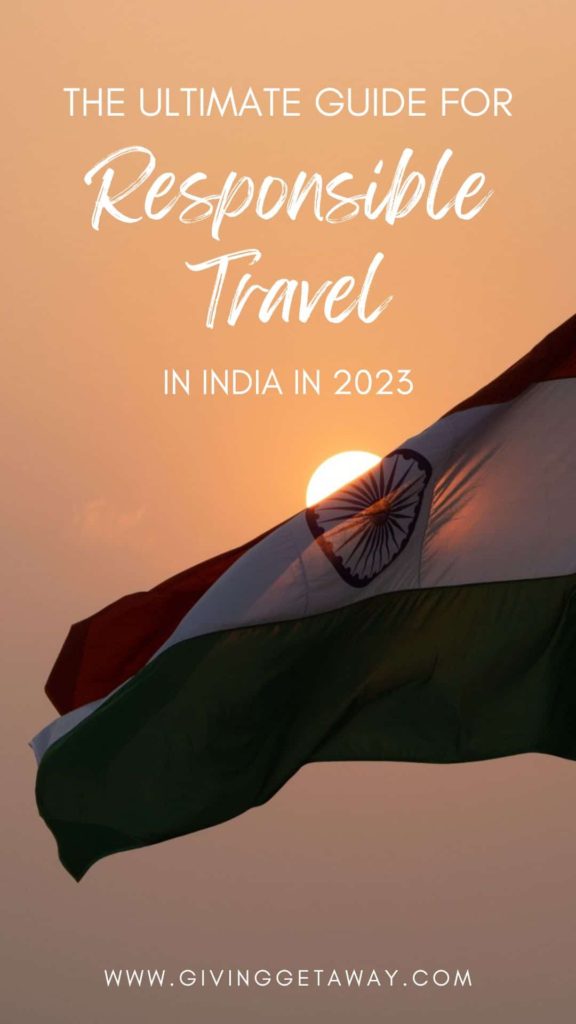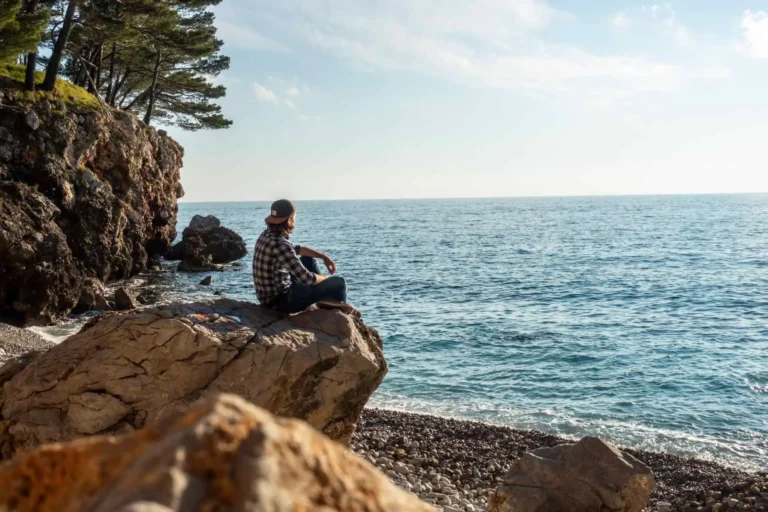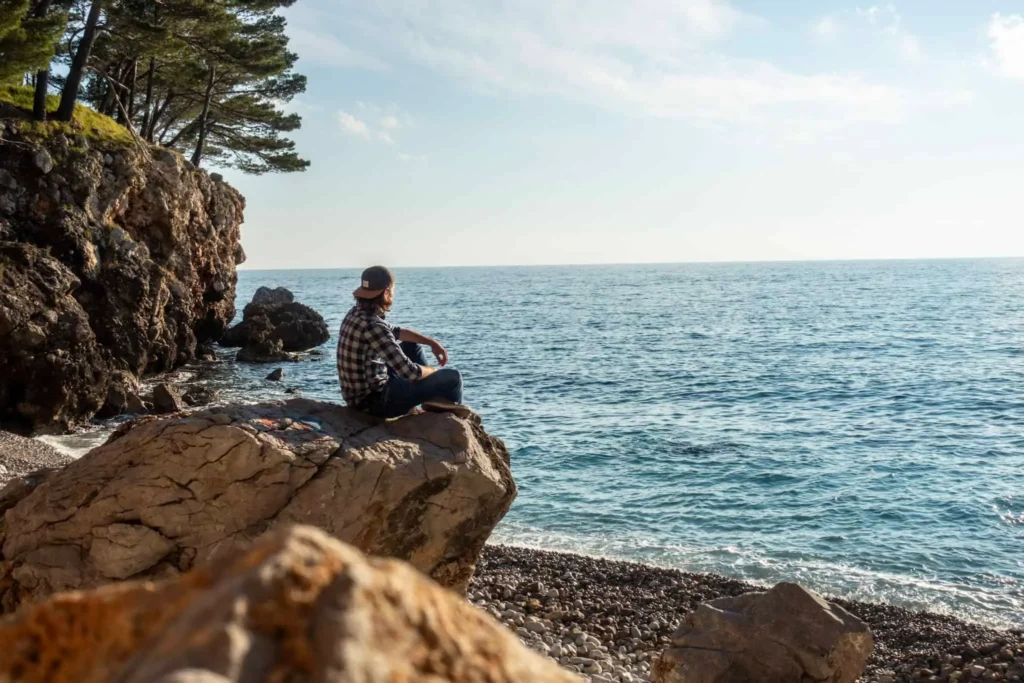| This post may contain affiliate links. Whenever you book or buy something through one of these, Giving Getaway gets a small commission, of which 100% will be donated to charity, without any extra cost to you! |
India is a land of contrasts, where the bustling cities of Delhi and Mumbai sit alongside the tranquil backwaters of Kerala and the pristine beaches of Goa. With so much to see and do, it’s easy to overlook the impact our travels have on the environment and communities we visit. But by practicing responsible travel in India, we can experience the country in its full glory without contributing to any negative impacts on its population or environment and help to ensure that future generations can enjoy the beautiful destinations we visited, too.
In collaboration with several Indian travelers who shared their expertise about their culture and the possible ways to travel responsibly in India with Giving Getaway, I decided to write an article about this important topic.
As travelers we owe it to ourselves to explore our world consciously—and this means doing so responsibly wherever we go. Fortunately, with just a little bit of effort you can ensure your trip to India is ethical and sustainable.
With these simple yet effective steps, you will be able to create lasting memories without compromising on ethics or causing harm along the way.
What Is Responsible Travel?
To travel responsibly means to make conscious and informed decisions about our travels in order to minimize the negative impacts of tourism on both people and places. It takes into account the effects of tourism on local cultures, economics, environments and wildlife, as well as the importance of respecting different ways of life.
Responsible travelers are committed to creating positive experiences for all involved – from locals and fellow travelers to the environment they visit.
This means to respect cultural norms such as dress code or language customs, and to be mindful of environmental concerns to ensure that you’re not contributing to any further damage while exploring natural wonders.
It’s also essential to be aware of ethical practices when engaging with businesses during your travels. This includes everything from choosing locally owned hotels over corporate chains, eating at family-run restaurants instead of multinational fast-food outlets; buying souvenirs from small vendors rather than big box stores and supporting initiatives which promote sustainability.
All these activities help create an atmosphere conducive for sustainable development and contribute positively to local economies by providing employment opportunities or generating income for those living in poverty. By doing so we can ensure our presence is beneficial for everyone.
Understanding Indian Customs and Etiquette
Traveling to India is an experience that can leave you with life-long memories. It’s a place full of vibrant colors, exotic sounds and captivating smells. To get the most out of your time in this beautiful country, it’s important to always respect the cultural norms.
Here are some important Indian customs and etiquette to keep in mind:
- Dress modestly: India is a conservative country, and it’s important to dress appropriately, especially in places of worship. Avoid wearing revealing or tight clothing (more on that in the next section).
- Respect elders and authority figures: In India, elders and authority figures are treated with great respect. Use formal titles such as “sir” or “madam” when addressing them.
- Greet with “Namaste”: People often bow down slightly upon greeting another person as a form of respect; hence returning gestures like smiles or nods will likely be appreciated by locals. Similarly, Indians use ‘Namaste’, which translates into ‘I bow to you’, as a way of showing reverence towards others; so don’t forget to say Namaste whenever appropriate.
- Don’t touch someone with your feet: In Indian culture, the feet are considered impure, and it’s considered disrespectful to touch someone with your feet. Avoid pointing your feet at someone or using your feet to move objects.
- Use your right hand: When eating or accepting gifts, it’s customary to use your right hand, as the left hand is considered unclean.
- Don’t display public affection: Public displays of affection, such as hugging or kissing, are not common in India, especially in more conservative areas. It’s best to avoid these behaviors.
- Respect religious customs: India is a country of many religions, and it’s important to respect the customs and traditions of each religion. When visiting a temple or other religious site, be sure to dress appropriately and follow the rules and customs.
- Avoid pointing with your finger: Pointing with your finger is considered impolite in Indian culture. Instead, use your chin or hand to gesture.
Whenever you’re in doubt about local customs in India, do your research or simply observe local cultures closely and respect existing traditions without crossing any boundaries.
How to Dress Appropriately in India
When traveling in India, it’s important to be mindful of the dress codes that are integral parts of Indian culture. This is especially true when visiting religious sites or temples; what you wear can have a huge impact on how local people view your presence.
For women, this means wearing long skirts or trousers, preferably covering knees and arms, with a scarf for head-covering. It’s also wise to avoid tight fitting clothing as these may be considered inappropriate.
For men, modest attire such as loose pants and shirts should be worn; tank tops and shorts should always be avoided.
When entering holy places like Hindu or Sikh temples, always remove your shoes before entering and cover your head with a cloth if one isn’t provided at the entrance.
It’s worth noting though that while most areas do not require conservative dressing all the time, being respectful of local customs will ensure a better experience overall – both for yourself and those around you.
Respect for Religious Sites and Practices
Religious sites are a window to India’s spiritual and cultural heritage. And, as responsible travelers, we have the opportunity to appreciate this grandeur with humility and respect. Symbolically, these sacred spaces embody peace and divinity – a reminder of our common humanity and an invitation for connection with the divine.
When visiting religious sites in India, it is essential that visitors practice appropriate behavior out of respect for local customs and beliefs. Dressing modestly, as we’ve already covered, is one very important aspect to keep in mind.
It also includes avoiding speaking loudly or using an offensive language, as it can lead to serious consequences from both locals and authorities alike. Also, you should never take photos inside any religious building unless permission has been given by the temple authorities beforehand.
Avoid public displays of affection and do not touch any idols or religious symbols unless instructed by someone there; instead observe them from afar with reverence.
Additionally, when entering places of worship like temples or mosques, you should always remove your shoes before entering.
Most importantly though: be kind to everyone you encounter. Respectful behavior will ensure that both locals and tourists alike can enjoy their experience at Indian religious sites harmoniously.
Responsible Wildlife Tourism
India is an amazing place for those interested in nature and wildlife, and it provides an array of opportunities for tourists to explore its many national parks and wildlife sanctuaries. From elephant safaris to tiger safaris and bird watching, visitors can take part in incredible wildlife encounters.
However, it is essential to be aware that if wildlife tourism is not managed properly, it can have a damaging effect on both the environment and the animals. Here are some specific things to keep in mind when engaging in wildlife tourism in India:
- Avoid riding, trekking, bathing elephants: Elephants are often used for tourist rides in India, but this can be harmful to their welfare. Elephants are wild animals and those activities can cause them physical and psychological harm. Instead, consider observing them in their natural habitat, such as in national parks or wildlife sanctuaries.
- Do not feed or touch the wildlife: Feeding or touching wildlife is harmful to their natural behavior and can lead to dependence on humans for food. It can also cause them to become aggressive towards humans. Keep a safe distance from the animals and observe them in their natural habitat.
- Do not use flash photography: Flash photography can startle wildlife and can be harmful to their eyes. Avoid using flash photography when observing wildlife.
- Respect the wildlife and their habitat: Follow park rules and regulations and respect the wildlife and their natural habitat. Do not litter or disturb the natural environment.
- Choose responsible tour operators: Choose tour operators that follow sustainable tourism practices and have a positive impact on the local community. They should also ensure that all necessary permits are obtained and that rules and regulations related to wildlife conservation are followed.
By following these guidelines, you can enjoy a unique and rewarding wildlife experience in India while also contributing to wildlife conservation efforts.
Conservation of Natural Resources
Related to the previous section on responsible wildlife tourism, it is clear that conservation of natural resources should be at the forefront of sustainable and ethical travel in India as well.
When visiting India, it is essential to take responsibility for our actions and to be aware of certain issues. Currently, Deforestation, pollution, and other environmental issues have a devastating effect on both nature and local communities.
Here are some tips to ensure your travels help protect India’s valuable natural resources:
- Water conservation: India is facing a severe water crisis, with many regions experiencing water scarcity. It’s important to conserve water by reducing usage and adopting sustainable water management practices. This includes rainwater harvesting, using water-efficient fixtures, and avoiding wastage.
- Forest conservation: Forests are important for maintaining biodiversity and regulating the climate. India has a rich forest cover, but deforestation is a major issue. It’s important to conserve forests by preventing illegal logging, promoting afforestation, and supporting local communities that depend on forests for their livelihoods.
- Energy conservation: India is one of the largest energy consumers in the world, and its demand for energy is increasing rapidly. It’s important to conserve energy by promoting renewable energy sources and saving as much energy as possible.
- Waste management: India generates a huge amount of waste, and the majority of it ends up in landfills, leading to pollution and health hazards. To not contribute to this problem, you should bring your own reusable bags when shopping. Additionally, bringing along a water bottle that can be reused throughout your travels will help reduce single-use plastics.
- Air pollution control: Whenever possible, try to avoid renting cars and instead use public transport and bicycles when exploring a destination.
These simple steps will go a long way towards helping conserve India’s precious natural resources – something we must all strive for if we want future generations to enjoy them too. With careful consideration and an open mind there is no reason why travelling in India cannot be done responsibly whilst still having amazing experiences along the way.
Child Protection And Ethical Tourism
Child protection is a critical issue in India, with the country facing significant challenges related to child labor, trafficking, abuse, and exploitation. As a responsible traveler, there are several things you can do to promote ethical tourism and support child protection efforts in India.
- Educate yourself on the signs of child labor, trafficking, abuse, and exploitation. This will help you to make informed decisions about the activities and organizations you support during your travels.
- You should never give money directly to children as it enhances poverty rather than it helps to alleviate it. Read more about why you shouldn’t give to child beggars in my blog post about 20 Easy Ways to Travel While Doing Good.
- Choose responsible accommodations and tour operators that have a commitment to child protection. Look for certifications and accreditations such as ChildSafe or Travelife, which promote ethical tourism practices.
- Respect the rights of children and avoid engaging in activities that exploit or harm them.
- Consider volunteering or donating to organizations in India that work to protect children and promote their rights, but only after doing a thorough research on the organization.
- If you observe any suspicious activities or concerns related to child labor, trafficking, abuse, or exploitation, report them to the authorities or to a reputable organization working to combat child exploitation.
- Do not take photographs of children (but also adults) without permission, as it can lead to feelings of discomfort. Instead, take time to get to know people first before asking if you can photograph them.
By following these tips, you can help promote child protection and contribute to the well-being of children in India.
Supporting Local Businesses and Communities
You as a traveler can play a key role in promoting sustainable and ethical travel in India. You can do so by shopping from small, local shops; eating at family-run restaurants; visiting rural villages; and participating in community events.
Here are four ways to contribute to the well-being of people living in Indian communities:
- Seek out unique experiences that have been created by locals. Whether it’s taking a cooking class or trying traditional craftsmanship, tourists should be open to learning about new cultures through activities hosted by locals.
- Shop locally made items such as clothing, crafts, jewelry, food products etc., whenever possible.
- Avoid tourist traps like large souvenir stores or malls that offer mass produced goods not made in India. Instead, look for markets where artisans create handmade trinkets and other items using age-old techniques.
- Take part in volunteer opportunities offered by NGOs working on social issues in India. By doing so, you can gain insight into the country’s culture and history while helping support development projects aimed at improving lives of Indian citizens.
As responsible travelers we must remember our individual actions have real consequences on the places we visit– let’s make sure they’re positive ones! And if you would like to read more about this topic, feel free to read my blog post “5 Tips On How To Travel And Support Local Communities”.
Responsible Photography and Social Media Usage
It’s easy to get carried away when taking photos in India. Whether you’re capturing the beauty of a bustling market, or the vibrant colors of an iconic temple, it’s essential to take your time and respect local customs while shooting.
Be mindful that some places have restrictions on photography, so always check with locals before snapping away. It’s also important to avoid photographing people without their permission – even if they look photogenic! If someone does agree to be photographed, make sure to use your discretion when sharing any images online or via social media.
On social media specifically, don’t just share pretty pictures – think about how your posts could be received by those living in the area you are visiting. Consider using hashtags such as #travelresponsibly and #ecotourismindia which can help spread awareness for responsible travel practices. This is especially important today as many communities rely heavily on tourism for economic sustainability and cultural preservation.
When posting images from India, make sure that you are not promoting stereotypes or perpetuating platitudes about its culture and people. Instead, aim to portray authentic experiences through meaningful stories about the destinations you visit, as this will encourage others to explore responsibly and respectfully too!
Transportation and Accommodation
Transportation and accommodation are the two major components of sustainable tourism, not just in India. As a responsible traveler you should consider both when planning your trip to ensure that your impact is as minimal as possible.
When it comes to transportation, public transport is often the best option. Taking local buses or trains helps reduce greenhouse gas emissions while also providing an opportunity to connect with locals and learn more about Indian culture.
For those who need to travel longer distances, carpooling or if flying can’t be avoided, choose non-stop flights in economy class to minimize your environmental footprint. You can read more about this topic in my post “10 Tips On How To Travel With A Low Carbon Footprint”.
Accommodation wise, there are numerous eco-friendly options available across India – from homestays to treehouses. Staying at these places allows you to support small businesses while simultaneously reducing energy consumption and water waste.
If conventional hotels must be used, opting for smaller establishments rather than larger chains can have positive impacts on local economies and provide better experiences overall. Furthermore, being mindful of your usage of amenities such as air conditioning and towels is important too!
By making conscious decisions around transportation and accommodation, we can make sure our journeys are not just enjoyable but ethical too. Start by using the search widget below to look for sustainable accommodation, and once you complete a booking, I will get a commission of which I donate 50% to charity!
Restaurants and Shopping
Forget the five-star meals and luxury shopping; when it comes to sustainable travel in India, we’re talking about something entirely different. You won’t find us lining up for expensive designer goods or dining at fancy restaurants – instead, you’ll find us exploring local markets, enjoying street food and embracing traditional culinary practices.
As a responsible traveler, it’s important to be mindful of your choices and their impact on local communities and the environment. Here are some tips to help you make responsible choices when it comes to eating outside and shopping in India:
- When choosing restaurants and shops, opt for locally owned and operated businesses rather than international chains or franchises. This will help support the local economy and ensure that your money stays within the community.
- Look for restaurants and shops that prioritize sustainability and eco-friendly practices. This may include using local and organic ingredients, reducing plastic waste, and promoting eco-friendly products.
- Respect local customs and traditions when dining or shopping in India. Avoid exploiting cultural practices or purchasing products that may be offensive or culturally insensitive.
- Haggling and bargaining is common in many parts of India, but it’s important to do so responsibly. Don’t bargain excessively or push for an unfair price.
- India is home to several endangered species, and it’s important to avoid purchasing products made from endangered animal or plant species. This includes products made from ivory, animal skins, and certain types of wood.
By following these tips, you can make responsible choices when it comes to restaurants and shopping in India. Remember, responsible travel is about making choices that have a positive impact on local communities and the environment and supporting sustainable and ethical practices.
Conclusion
As travelers, it is our responsibility to be mindful of the impact we have on other cultures and environments. We must take into account the customs, etiquette, dress codes, religious practices, and cultural differences in order to ensure that our travels are respectful and sustainable, not just when visiting India, but also when visiting other countries around the world.
By taking the time to research these matters before embarking on a journey, we can be sure that our travel experience will be both responsible and enriching.
In terms of sustainability, it pays off to do research on accommodations prior to booking your stay. Look into eco-friendly hotels or other eco-tourism initiatives such as homestays which help support local communities by allowing travelers to experience authentic living conditions without compromising natural resources and wildlife habitats.
Furthermore, by choosing transportation methods such as public transport or carpools over private cars – and selecting accommodation options which prioritize environmental sustainability – we can reduce our carbon footprint while also supporting local businesses.
Responsible Travel in India and other parts of the world is not only good for the communities we visit, it’s also good for us and future generations of travelers. So let’s make every effort to contribute positively to India’s culture and environment – leaving behind a legacy of respect, harmony and mutual understanding between people from all walks of life!
For the first step I encourage you to book your future trips including travel essentials such as hotels, flights, rental cars with Giving Getaway.
By booking through Giving Getaway, you’ll not only have an amazing trip, but you’ll also make a difference. 50% of the commission earned from each completed booking goes towards organizing charity events, such as the 2021 Christmas gift drive for kids and teenagers in a children’s home in Montenegro – at no extra cost to you!
So, book your trip with Giving Getaway and make a positive impact while enjoying your travels!



